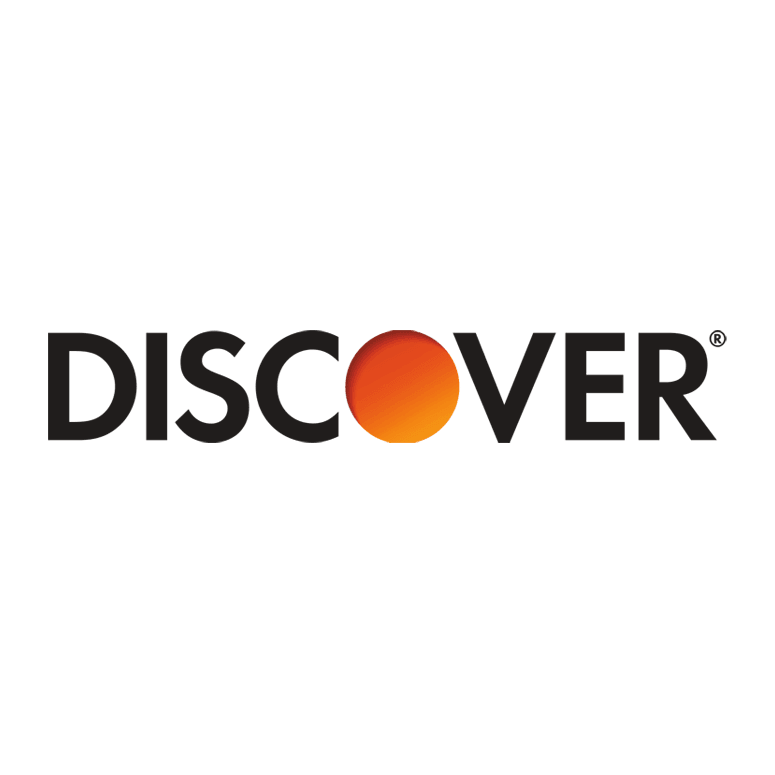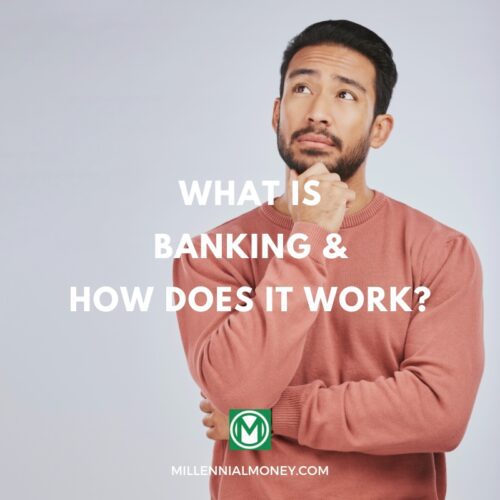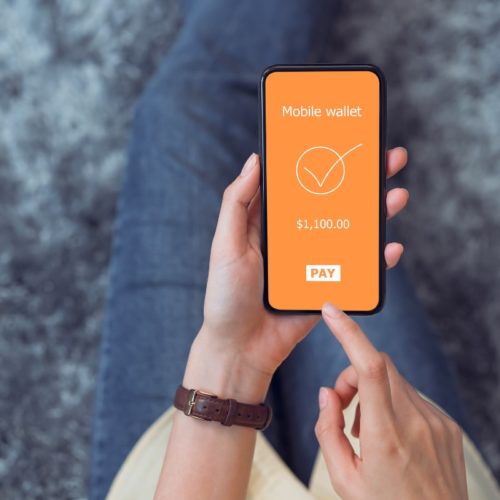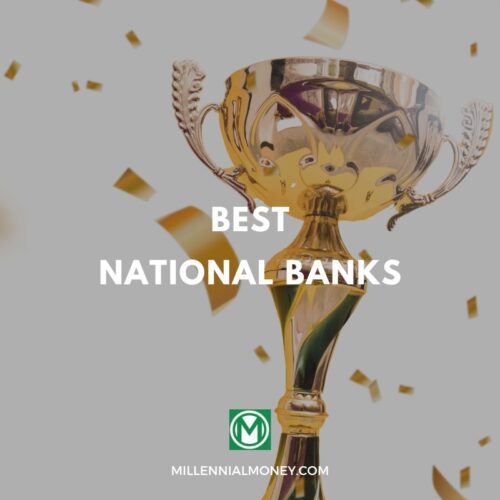Finding the best banks for millennials can feel like a complicated task. I’ve researched dozens of online, local, and regional banks to identify the best of the best, prioritizing banks with minimal fees, accessibility, modern banking tools, and competitive accounts.
Whether you’re looking for one bank to handle all your financial needs or several banks for multiple uses, one of the institutions on our list of banks for millennials should fit your needs.
10 Best Banks for Millennials in 2025
If you’re a millennial, here are the best banks you can open an account with today:
- Discover® Bank
- Chase Bank
- Synchrony Bank
- UFB Bank
- US Bank
- PNC Bank
- Bank of America
- Ally Bank
- CapitalOne Bank
- Axos Bank
1. Discover® Bank
🏆 Best for Cash Back
Discover® Bank is one of the best online banks that takes a low-fee, high-interest approach. I like Discover’s 1-percent cash-back rewards when you use your checking account. You earn 1% back on up to $3,000 in debit purchases monthly.
Discover also offers an online savings and money market account, as well as high-yield CDs. The Discover checking, savings and cd accounts don’t have a minimum opening deposit requirement, but the money market accounts require a $2,500 opening deposit, which can be steep for some.
Discover Bank lets account holders access 60,000 fee-free ATMs. The bank has a highly-rated app and the ability to make mobile deposits, which is key for an online bank.
Pros:
- Simple account options
- 1% cash back on debit card transactions
- 24/7 customer service
Cons:
- Can’t deposit cash
2. Chase Bank
🏆 Best For Signup Bonuses
Chase is the biggest bank in the nation, and it has an impressive lineup of checking and savings accounts, credit cards, mortgages, and investment products. It stands out for its impressive promotions for new account holders.
Chase has over 4,700 branch locations, and it’s the first bank in the nation to have locations in all 48 of the contiguous United States. Customers also get access to a network of 16,000 ATMs.
The bank stands out among traditional banks with its sleek online and mobile banking features. Chase offers several different checking accounts, ranging from starter accounts for kids to premium interest-bearing accounts, savings accounts, and CDs with surprisingly high APYs for a large bank.
Pros:
- Account fees can be waived
- Massive network of branches and ATMs
- Frequently offers bonuses on new accounts
Cons
- Lower CD and savings rates
- Steep monthly fees
*must setup direct deposit within 90 days to earn bonus cash.
3. Synchrony Bank
🏆 Best APY on Savings
Synchrony Bank is an online bank that offers high-yield savings, money market, and CD accounts. While they don’t offer checking accounts, they make up for this downside with impressive APYs on their savings accounts, which is uncommon for many banks.
Their savings account pays a much higher APY than their money market, but neither account requires a monthly fee or minimum monthly balance. They will also reimburse up to $5 of non-network ATM fees per month.
If you’re simply looking for a user-friendly bank where you can park your savings and don’t mind housing your checking accounts elsewhere, Synchrony could be worth a closer look.
Pros:
- High APYs
- Reimburses non-network ATM fees
- No monthly fees
Cons:
- No checking account
- Low money market APY
4. UFB Direct
🏆 Best ATM Network
UFB Direct is another online bank offering great APYs, especially on its savings account. While UFB Direct might appear to only offer savings, money market accounts, and mortgage loans, when you apply for a savings or money market account, you can add a UFB Freedom Checking Account.
Whether you choose a savings or money market account, you’ll earn some of the highest interest rates in the industry. The savings account doesn’t have a monthly maintenance fee and you can waive the MMA’s monthly fee with a qualifying minimum balance.
UFB has an impressive ATM network of 91,000 ATMs, and there’s no minimum balance to open an account.
Pros:
- Competitive savings rates
- Over 91,000 ATMs
- Checking account add-on
Cons:
- No physical branches
- Monthly fee for MMA account
5. U.S. Bank
🏆 Best Mobile App
U.S. Bank has a massive presence, with more than 2,000 branches that span 26 states. It offers the best of both worlds, with the accessibility of a traditional bank and the technology of an online bank.
U.S. Bank’s app is highly rated thanks to its Smart Assistant, an AI tool you can type or talk to when you have questions that need quick answers. It can even carry out tasks like paying off your credit card balance.
When it comes to products, US Bank offers a long list of commercial, small business, and personal banking products, such as checking, savings, money markets, and CDs.
Like most big banks, the APYs aren’t the highest, but U.S. Bank has numerous short-term CD options and CD specials with promotional rates; you also benefit from its large physical presence. And even though it’s a national bank, U.S. Bank keeps its monthly fees low, and easy to waive.
Pros:
- 24/7 phone support
- Excellent mobile app
- Versatile CD options
Cons:
- Has monthly fees
- Less competitive savings rates
6. PNC Bank
🏆 Best Banking Products
PNC Bank is a large East Coast institution with a traditional approach to banking and a full suite of financial accounts and services. The bank also pioneered online banking with its Virtual Wallet, a hybrid checking and savings account with convenient mobile banking features.
The Virtual Wallet app gives you a real-time, visual analysis of your accounts, along with some nice budgeting tools.
As a traditional bank, PNC has branded ATMs and branches throughout its East Coast market. It also comes with monthly fees, though you can avoid them by meeting a few requirements.
Though it does offer the convenience of an online bank, PNC Bank doesn’t compete with online-only banks’ high-yield savings rates. If you prioritize being able to visit a local branch and still having access to a streamlined app, consider PNC.
Pros:
- User-friendly mobile banking
- Wide network of branded ATMs and branches
- Variety of banking products and loans
Cons:
- High overdraft fees
- High balance to waive monthly maintenance fees
7. Capital One Bank
🏆 Best Online Bank
Capital One Bank offers a hybrid approach—it’s an online bank with hundreds of brick-and-mortar branches and cafes.
If you don’t live near a branch, they still offer one of the best online banking experiences, including customer service via chat or Twitter and convenient budgeting tools. Capital One also gives you access to more than 70,000 Allpoint and MoneyPass ATMs.
Like all the banks on this list, Capital One’s interest rates exceed the national average, especially its savings and CD rates. Another of its biggest perks is that most of Capital One’s accounts, including checking and savings accounts, don’t have monthly fees.
Pros:
- 70,000+ fee-free ATMs
- Great CD rates
- Competitive new account bonuses
Cons:
- No money market account
- Only has branches in 9 states
8. Bank of America
🏆 Best Traditional Nationwide Bank
Similar to Chase, Bank of America is a major national bank, touting more than 3,800 locations and 15,000 ATMs.
You can choose from dozens of investment, lending, business, and personal banking products. As a traditional bank, Bank of America’s interest rates don’t stack up to the competition of online banks, but its user experience does.
The bank and its app have solid customer reviews on third-party sites like the Better Business Bureau and the App Store.
Bank of America also stands out for its signup bonuses on new checking accounts. The downside is Bank of America’s fees on its checking and savings accounts, which you may be able to waive depending on your account balance.
Pros:
- Accessible customer service
- Solid mobile app and banking tools
- Compatible with Zelle
Cons:
- Less competitive APY than online banks
- Monthly maintenance fee
9. Ally Bank
🏆 Best Bank for Customer Service
Ally is another of my favorite online banks because it pays higher-than-average interest rates on your savings account and checking accounts.
Ally Bank sets a high standard for online banks, delivering great savings rates, low fees, overdraft coverage, and various account options.
It’s harder to beat Ally’s convenience. You can access your accounts using the bank’s app and use Allpoint ATM for free. If you use another bank’s ATM, you’ll get reimbursed for out-of-network ATM fees.
Ally Bank offers various accounts, including checking, savings, money market, and high-yield CDs. The nice thing about their CDs is they don’t require a minimum opening deposit, making them accessible to anyone. Plus, Ally Bank doesn’t charge monthly maintenance fees.
Pros:
- Variety of accounts
- No monthly fees
- 24/7 customer service
Cons:
- No physical branches
- Can’t deposit cash
10. Axos Bank
🏆 Best Variety of Checking Accounts
Formerly the Bank of Internet USA, Axos is another of our favorite online banks for millennials.
While you can’t go to a physical branch to meet with a representative, Axos offers 24/7 customer support for its banking products by phone. You can also use Evo, the bank’s virtual chat assistant.
Axos offers an impressive suite of business banking products, ranking high on our list of business checking accounts.
We also like Axos’ versatile checking accounts that are designed to meet a range of needs. You can choose from an essential checking account with two-day pay advances, a rewards checking account, and a cashback checking account.
Pros:
- Competitive checking rates
- Over 91,000 ATMs and reimbursements
- No monthly account fee
Cons:
- Mediocre CD rates
- No branches
How to Choose the Best Bank for Millennials
Deciding on the right bank might not seem like a big deal, but for millennials juggling student loans, saving for a home, or starting a business, it’s a crucial step toward financial health.
With hundreds of banking options from traditional to online-first institutions, choosing the right bank can feel overwhelming. Here are some factors to zero in on to choose the right bank:
- Determine what account you need: Don’t assume all banks have all the accounts you need. Decide what types of accounts you need first, and then look for a bank that offers them.
- Consider your lifestyle: Do you prefer managing money from your smartphone, or do you value face-to-face interactions? Online banks often offer higher interest rates and lower fees due to their low overhead. However, traditional banks provide in-person support which could be invaluable if you prefer it.
- Understand the requirements: Each bank has different requirements regarding minimum opening deposits, minimum average balances, and the allowed number of transactions. Make sure you can meet the requirements and the limits fit within your needs.
- Evaluate the fees: Most traditional bank accounts have fees, but they usually offer ways to waive them. Look for accounts with requirements you can meet so you don’t pay fees.
- Look at APYs: If you’re using the account to deposit a large amount of money, consider finding an account that pays the highest APY. While interest rates may not be the sole deciding factor, they’re worth considering, especially for long-term savings goals.
- Look at the ATM network: If you use ATMs a lot, make sure the bank’s network is convenient for you so you don’t pay out-of-network fees.
- Consider online and mobile banking options: Ensure the bank offers the mobile and online banking features you need, such as mobile deposit or Zelle.
- Check out the perks: Cashback rewards, sign-up bonuses, and referral bonuses are just a few examples of how banks reward new customers. While they shouldn’t be the only reason you choose a bank, they can be a nice bonus.
Methodology
When choosing the best banks for millennials, we looked at various factors to provide you with the best recommendations:
- Fees: We look for banks that either don’t charge monthly maintenance fees or ones that offer a way to waive them. We look closely at the requirements and ensure they’re easy enough for the average consumer to meet.
- Accessibility: Having a bank account that’s difficult to access or use is pointless. We look for banks with a large ATM network and many ways to access the account, including electronic transfers and in-person deposits.
- Account options: The banks on our list include many account types including checking, savings, money markets, and CDs. Everyone has different banking needs and these accounts help you satisfy them.
- Large ATM network: ATMs are important, especially if you use an online bank. The banks on this list have vast ATM networks, and some even include non-network ATM reimbursement.
- Account features: We prioritize banks that offer convenient features like mobile deposits, Zelle compatibility, overdraft coverage, and 2-day early pay.
- User experience: We also hone in on user experience, examining each bank’s app and online resources and exploring customer reviews in the App Store and Google Play Store.
Frequently Asked Questions
What do millennials want from banks?
Millennials prioritize different factors than other age groups when it comes to banking. For example, millennials like myself care more about having access to a streamlined mobile app with intuitive features than my parents might be.
Should I choose a brick-and-mortar bank or an online bank?
It depends. If you prioritize getting the highest interest rates and lowest fees and like the convenience of banking on the go, an online bank is your best bet.
However, if you prefer to do business in person at a local bank, a traditional brick-and-mortar bank makes more sense. This option is also better if you frequently need to make cash deposits.
Where should millennials keep their money?
There are a variety of places millennials can keep their funds so they can grow safely. Some of the best options include high-yield savings accounts, CDs, and money market accounts from FDIC-insured banks or NCUA-insured credit unions. While it carries more risk, investing in the stock market can give you higher returns.
Are credit unions safer than banks?
Credit unions may have higher APYs or lower fees than banks, but they aren’t necessarily safer. As long as you bank with an FDIC-insured bank, your deposits are safe up to $250,000 per depositor, just like they are at NCUA-insured credit unions.
Some banks also participate in sweep networks, where they partner with other banks to offer higher levels of FDIC insurance.
Are there banks for freelancers?
Yes, A lot of millennials have turned to freelancing, and fortunately, several great banks cater to freelancers and their specific financial needs. While many banks require businesses to be registered LLCs to get a business account, banks like Bluevine and Axos offer business accounts to freelancers or independent contractors without the LLC requirement.






Read 2 comments or add your own
Read Comments